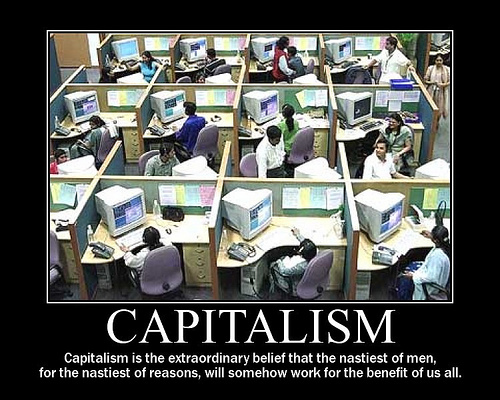Follow Me!
“Words are finite organs of the infinite mind. They cannot cover the dimensions of what is in truth.” – Emerson
But they can come pretty close and sometimes they can help the evolution of our beliefs and values. I tend to absorb experiences and sometimes it takes me some time to collate them into my collection of impressions. A lot of this has to do with finally settling on the right words to define my thoughts. I think that I’m getting closer to my philosophy on business – given that I’ve had some quite varied input over the years. I’m excited to run across a book that helps me to find the words to summarize and define my journey and conclusions. Conscious Capitalism: Liberating the Heroic Spirit of Business, A paradigm shift in management by John Mackey, Co-CEO of Whole Foods Markets and Raj Sisodia.
I have been fortunate in the past to work for several companies that had a grasp of the concept of Conscious Capitalism and these “conscious businesses” significantly outperform traditional businesses over the long run. I’ve also had the contrasting experience where the style results in what can be termed as corporate cancer where the focus is solely on maximizing shareholder value and profits. Where the investor is seen as the only stakeholder that matters and senior management teams maximize their own compensation without creating commensurate value. In many cases, executives simply pay themselves too much, with little concern for internal equity or connection with overall performance. This is a business that is at high risk of creating and growing a cancer that may one day destroy it.
The contrast between my experiences is huge, and contrast is an extremely helpful tool when fashioning words to define what’s on your mind.
The following is an excerpt from an article written by Steve Denning in Forbes, 1/05/2013
The book is a hymn of praise to the emerging new paradigm of management as well as a guide on how to implement it. The book isn’t just talking about a few management techniques or tools. It’s presenting a different way of thinking and speaking and acting in the workplace.
Mackey and Sisodia call their particular flavor of the paradigm shift “conscious capitalism”. Other writers use different terms, including “customer capitalism”, “stakeholder capitalism”, “management 2.0”, “reorganizing for resilience”, “the power of pull”, “employees first”, the “net promoter system”, “wiki-management” or “radical management”.
Whatever it is called, it is radically different from the management mindset of most of the Global 1000, from the management practices usually advocated by leading consulting and private equity firms, and from the management practices taught in the majority of courses in today’s business schools and celebrated endlessly in some management journals.
The shift in management paradigm is as transformational as the shift from the medieval view that the sun revolves around the earth to the view that earth and the other planets revolve around the sun. It is a fundamental transition in world-view. Once you make this shift, everything is different.
Top executives at the helm of many major corporations have rigged the game to enrich themselves at the expense of the company and its stakeholders. According to the Institute for Policy Studies, the ratio between CEO pay and average pay was 42: 1 in 1980, 107: 1 in 1990, and 525: 1 in 2000. It has fluctuated in recent years, standing at 325: 1 in 2010.
The new management paradigm is necessary in part because the landscape for business has been transformed. People today care about different things and are better informed, better educated, and better connected than in the past; their expectations from businesses in their roles as customers, team members, suppliers, investors, and community members are rapidly changing. Unfortunately, most companies have not evolved to keep pace with all these changes and are still doing business using mind-sets and practices that were appropriate for a very different world.
Conscious businesses recognize that each of their stakeholders is important and all are connected and interdependent, and that the business must seek to optimize value creation for all of them. All the stakeholders of a conscious business are motivated by a shared sense of purpose and core values. When conflicts and potential trade-offs arise between major stakeholders, conscious businesses engage the limitless power of human creativity to create win-win-win-win-win-win solutions that transcend those conflicts and create a harmony of interests among the interdependent stakeholders.
Please Share!
